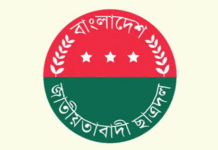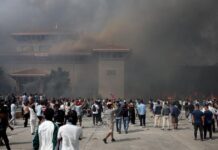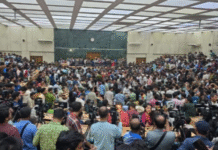Eid, need and greed
 The countdown for Eid began even before Ramadan commenced and with less than two weeks left for the day, the city’s shopping centres are almost bursting at their seams with shoppers.
The countdown for Eid began even before Ramadan commenced and with less than two weeks left for the day, the city’s shopping centres are almost bursting at their seams with shoppers.
Armed with their Eid bonus, they are all out there, vying for the best pair of shoes, the latest sari, the smartest panjabi or the prettiest clothes for the little ones. Eid is in their air.
But like all special occasions nowadays, the spirit of the season is lost under a deluge of consumerism. Naturally, everyone wants new clothes for Eid, gifts and good food. That is, after all, a part and parcel of the joyful occasion. However, in the spirit of Ramadan, indeed, in the spirit of Eid, has crass commercialism got the better of us?
More or less everyone zealously ensures that they mete out the prescribed zakat and make arrangements for this charity to the poor. It is sad to see many shops have separate ‘zakat’ saris and lungis, cheap and in abundance, so the donors can buy in bulk – quality be damned. It is as if quantity matters more because that is visible. But often these saris and lungis are of such poor quality that it is an insult to the recipient and certainly a shame to the giver.
“When donating zakat, you may give saris and lungis to the poor, but make sure these are of minimum standard at least. Show them respect and give them decent clothes, not just giving for the sake of giving, in a mere display of largesse,” said a religious leader during a recent pre-iftar TV show. The speakers on the show were discussing the spirit of giving during Ramadan and Eid. He cautioned against the stampedes and even unfortunate deaths that have occurred in the past during large-scale distribution of saris and lungis before Eid. This is not charity. This is a callous and crude display of wealth, certainly not in keeping with the spirit of Islam.
Greed of a certain section of people overrides the need of others. It would be downright unfair and wrong to castigate the ‘rich’ for neglecting the poor.
Generalisations are deplorable. But sadly, the fact remains that while some have a surfeit of goods and goodies for Eid (just as they do on iftar), there are those steeped in poverty, for whom Eid is just another day, unless they are lucky enough to have a new dress or a plate of semai.
You can walk into any high-end fashion store of the city and there is that inevitable bejewelled lady haggling with the salesman over a sari. He’ll want 60 thousand taka for it, she won’t want to part with more than 40 thousand. They’ll finally meet midway and 50 thousand changes hands. That is not all. She’ll then sail off to the shoe and bag section to shed off another few thousand. Then there is the rest of the family, the children, the husband, gifts for friends and extended family and more. Well, they’ve earned the money (who are we to judge whether by foul means or fair?) and they have the right to spend it.
But how does it feel when they emerge from the air-conditioned comfort of the cushy store and walk towards their shiny car? What do they see? Do they see the old rickshaw puller, pedalling down the street on the scorching summer’s day, his faced etched with lines of suffering and sorrow. Who will give him zakat? His passengers themselves are of the struggling middle class, torn between their slim wallets and pressures of family needs and the maintaining minimum social standards.
As the wealthy ones enter their luxury mansions in the hallowed locales of the capital city, do they spare a thought for those labourers who toiled relentlessly, carrying heavy bags of cement, sand and stones to build this haven? What will they have for Eid? What will they give their children on Eid morning?
It is not just about Eid. It’s about Ramadan too – the sacred month of self-control and sacrifice.
As the nouveau riche gather at the five-star hotels or in their decadent dining halls for iftar followed by delicious dinners, do they really grasp the spirit of the month? It is not just being judgemental because they are rich, but can they see through their gilded cocoons and even slightly perceive the pangs of hunger of the poor? After all, it is more than just doling out charity to the nearest masjid, madrasa or orphanage. It is about mindset, the spirit within.
Ramadan is just one month – but it teaches lessons of life. It teaches temperance as a way of life. It is against excesses. Flaunting riches can hurt the underprivileged. It won’t put a dent in the rich man’s pocket to ensure a better Eid for a few poor families. It won’t hurt that socialite to buy one less designer bag and instead feed a family for a month, or more.
Charity, given in the right spirit, can be a formidable tool against poverty. The government has anti-poverty policies in place and these are making a difference. Micro-credit also has played a role in assuaging poverty to an extent. NGOs are doing their bit. But if all, each in their own capacity, just did a bit to put the need of others before their own greed, surely the world would be a better place.









